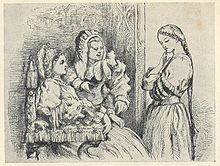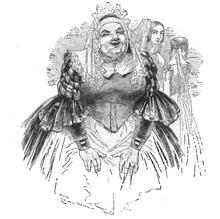- Nurse (Romeo and Juliet)
-
Nurse Creator William Shakespeare Play Romeo and Juliet Other name(s) Angelica (possible real name) Family Unnamed (husband)
Susan (daughter)Associates Juliet (surrogate daughter) The Nurse is a major character in William Shakespeare's classic drama Romeo and Juliet. It is revealed later in the play by Lord Capulet that the Nurse's real name might be Angelica (as the line could also be addressed to Lady Capulet). She is the personal servant, guardian (and former wet nurse) of Juliet Capulet, and has been since Juliet was born. She had a daughter named Susan who died in infancy, and was wetnurse to Juliet. As the primary person to like, she is therefore Juliet's foremost confidante. She is one of the few people, along with Friar Laurence, to be made aware of the blossoming romance between Romeo and Juliet. Her personal history outside of the Capulet estate is unknown, other than that she once had a husband and a daughter, Susan, both of which are deceased. Juliet is considered by many, historians and fans alike, to be her surrogate daughter in many respects because she took care of Juliet as a baby in Lady Capulet's absence.
Contents
Origins
The Nurse is a character in Arthur Brooke's poem The Tragical History of Romeus and Juliet, as Shakespeare's main source text. She is like family to the Capulets. The Nurse plays a similar role in the poem by Brooke, though she is less critical of Paris and is banished for the events that took place.[1]
Role in the play
The Nurse is sent by Juliet in act two, scene four to seek out Romeo the night after their first kiss and exchange of vows. The Nurse finds Romeo in act two, scene four and soon after returns to Juliet with news of Romeo's continued affection. It is because of the Nurse's approval that Juliet ultimately decides to go through with marrying Romeo.
Later, the Nurse is overcome with grief at the death of Tybalt, and she runs to Juliet and cries, "he's dead, he's dead, he's dead! We are undone, lady, we are undone! Alack the day! he's gone, he's kill'd, he's dead!"[2] The Nurse is the one to deliver the news of Romeo's banishment to Juliet; in spite of Tybalt's murder coming from Romeo's hands, Juliet seeks out Romeo at Friar Lawrence's cell for one final night with him before he flees to Mantua.
When Juliet learns that her parents expect her to marry Paris, the Nurse urges the girl to go ahead with the marriage. Even though Juliet was already married to Romeo, the Nurse felt that Juliet would never see her husband again. Following this, Juliet feels betrayed and decides never to share any more of her secrets with the Nurse.
The Nurse discovers Juliet under the spell of Friar Lawrence's potion in act four, scene five, and the grief of her death as seriously as she mourned Tybalt. She is, finally, present at the real deathbed of Romeo, Juliet, and Paris, though speechless. Indeed, she loses perhaps the dearest friends of anyone, having suffered through the deaths of her husband, Susan, Tybalt, Romeo, and Juliet.
Analysis
In choosing forms, Shakespeare matches the poetry to the character that uses it. Friar Lawrence, for example, uses sermon and sententiae forms, and the Nurse uses a unique blank verse form that closely matches colloquial speech.[3]
Friar Lawrence agrees to marry Romeo to Juliet in an attempt to mend the dispute between the two families; the Nurse sees their union as one of legitimate romance. The Nurse recognizes that Juliet shows no interest in Paris' courting and is the only member of the older generation to take Juliet's feelings into consideration…that is, until she suddenly betrays Juliet's trust by saying that she should marry Paris. Only to the nurse does Juliet confide her feelings about both Paris and Romeo. The formal language Juliet uses around Paris, as well as the way she talks about him to her Nurse, show that her feelings clearly lie with Romeo.[4]
The Nurse also admits to being something of a fool, proclaiming, "were not I thine [Juliet's] only nurse, I would say thou hadst suck'd wisdom from thy teat."[5] She is implied to be ugly by Mercutio, who urges the Nurse's servant Peter to fetch her fan quickly, "to hide her face; for her fan's the fairer face." Mercutio also mentions her age, calling her an "ancient lady" as he exits from the same scene. Some illustrations even depict her as an obese or big boned woman.[citation needed]
The Nurse is also a frequent user of malapropisms.
Performance history
A short sample of famous Nurses follows:
- Miriam Margolyes in Baz Luhrmann's Romeo + Juliet.
- Pat Heywood in Franco Zeffirelli's 1968 film.
- Edna May Oliver in the 1936 film.
- Flora Robson in the 1954 film.
- Debbie Rochon in Tromeo & Juliet.
Notes
References
- Halio, Jay (1998). Romeo and Juliet. Westport: Greenwood Press. pp. 1. ISBN 0-313-30089-5.
Categories:- Fictional characters introduced in 1597
- Fictional Italian people in literature
- Female Shakespearean characters
- Characters in Romeo and Juliet
Wikimedia Foundation. 2010.



